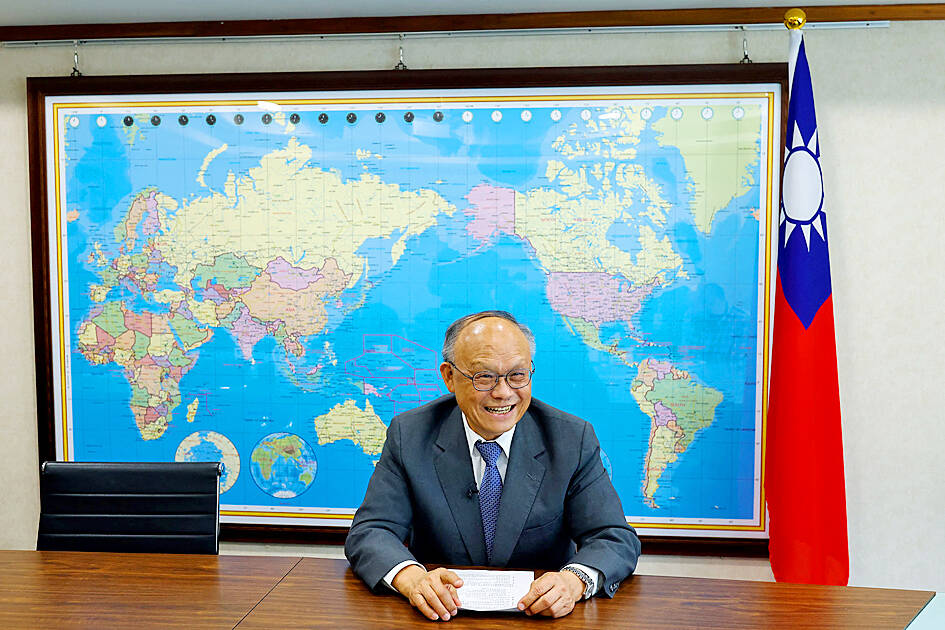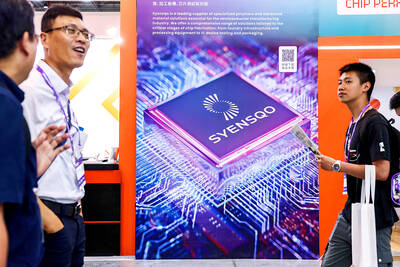Taiwan and the EU should sign a long-stalled investment agreement if Europe wants long-term investment from the nation, Taiwan’s top trade negotiator said yesterday as the bloc courts tech firms such as Taiwan Semiconductor Manufacturing Co (TSMC, 台積電) to build factories there.
Taiwan has repeatedly called for progress on a bilateral investment agreement (BIA) with the EU.
The EU included Taiwan on its list of trade partners for a potential deal in 2015, but it has not held talks with Taipei on the issue since.

Photo: Ann Wang, Reuters
The EU has been courting Taiwan, a major chip producer, as one of the “like-minded” partners it would like to work with under the European Chips Act to encourage more semiconductor production in Europe and lessen dependence on Asia, despite the lack of formal ties with the nation.
Minister Without Portfolio John Deng (鄧振中), Taiwan’s top trade representative, said that Europe was “definitely envious” of TSMC’s US$40 billion investment in Arizona, where it plans to make advanced 3-nanometer chips, because TSMC was bringing a whole supply chain over with it.
“For Europe, this is not the same scale — it’s individual cases, not on the same level as TSMC” in the US, Deng said.
TSMC, the world’s largest contract chipmaker, is in talks over a factory in Germany, which would be its first in Europe, although it would focus on the auto industry and make less-advanced chips.
Taiwan had engaged in lots of dialogue with the EU, but the bloc was resisting establishing a legal framework for investment that would provide “a sense of security” for Taiwanese businesses, Deng said.
“Our argument is that if you want long-term development for the future, a legal framework is very important,” he said. “For example, you want a very large investment for 100 years, 50 years, you don’t want it gone after three years... I think the European Commission needs to be clear on that point.”
Taiwan has also been in talks with Canada for a deal to encourage two-way investment — the Foreign Investment Promotion and Protection Arrangement — and Deng said he expected something to be signed this year.
He said he hoped that Canadian Minister of International Trade, Export Promotion, Small Business and Economic Development Mary Ng (伍鳳儀) might travel to Taiwan to sign it.
“Taiwan is very hospitable,” Deng said. “If she comes, Taiwan will look after her well.”

SEMICONDUCTOR SERVICES: A company executive said that Taiwanese firms must think about how to participate in global supply chains and lift their competitiveness Taiwan Semiconductor Manufacturing Co (TSMC, 台積電) yesterday said it expects to launch its first multifunctional service center in Pingtung County in the middle of 2027, in a bid to foster a resilient high-tech facility construction ecosystem. TSMC broached the idea of creating a center two or three years ago when it started building new manufacturing capacity in the US and Japan, the company said. The center, dubbed an “ecosystem park,” would assist local manufacturing facility construction partners to upgrade their capabilities and secure more deals from other global chipmakers such as Intel Corp, Micron Technology Inc and Infineon Technologies AG, TSMC said. It

People walk past advertising for a Syensqo chip at the Semicon Taiwan exhibition in Taipei yesterday.

NO BREAKTHROUGH? More substantial ‘deliverables,’ such as tariff reductions, would likely be saved for a meeting between Trump and Xi later this year, a trade expert said China launched two probes targeting the US semiconductor sector on Saturday ahead of talks between the two nations in Spain this week on trade, national security and the ownership of social media platform TikTok. China’s Ministry of Commerce announced an anti-dumping investigation into certain analog integrated circuits (ICs) imported from the US. The investigation is to target some commodity interface ICs and gate driver ICs, which are commonly made by US companies such as Texas Instruments Inc and ON Semiconductor Corp. The ministry also announced an anti-discrimination probe into US measures against China’s chip sector. US measures such as export curbs and tariffs

The US on Friday penalized two Chinese firms that acquired US chipmaking equipment for China’s top chipmaker, Semiconductor Manufacturing International Corp (SMIC, 中芯國際), including them among 32 entities that were added to the US Department of Commerce’s restricted trade list, a US government posting showed. Twenty-three of the 32 are in China. GMC Semiconductor Technology (Wuxi) Co (吉姆西半導體科技) and Jicun Semiconductor Technology (Shanghai) Co (吉存半導體科技) were placed on the list, formally known as the Entity List, for acquiring equipment for SMIC Northern Integrated Circuit Manufacturing (Beijing) Corp (中芯北方積體電路) and Semiconductor Manufacturing International (Beijing) Corp (中芯北京), the US Federal Register posting said. The